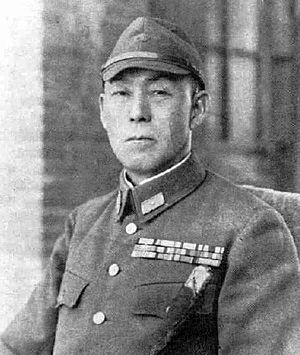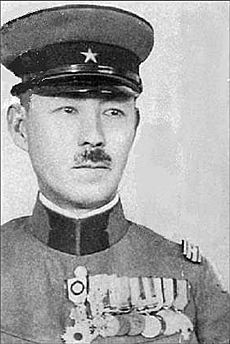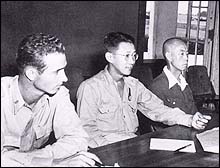Hong Sa-ik facts for kids
Quick facts for kids
Hong Sa-ik
|
|
|---|---|
 |
|
| Born | 4 March 1889 Anseong, Gyeonggi-do, Korea |
| Died | 26 September 1946 (aged 57) Manila, Commonwealth of the Philippines |
| Cause of death | Execution by hanging |
| Allegiance | |
| Service/ |
|
| Years of service | 1914-1946 |
| Rank | Lieutenant General |
| Battles/wars | World War II Philippines campaign (1944–45) |
| Hong Sa-ik | |||||||
|---|---|---|---|---|---|---|---|
| Japanese name | |||||||
| Kana | ホン・サイク | ||||||
|
|||||||
| Alternative Japanese name | |||||||
| Kana | こう しよく | ||||||
|
|||||||
| Korean name | |||||||
| Hangul | 홍사익 | ||||||
| Hanja | 洪思翊 | ||||||
|
|||||||
Hong Sa-ik was a military leader born in Korea in 1889. He was also known by the Japanese pronunciation of his name, Kō Shiyoku. He became a high-ranking officer, a lieutenant general, in the Imperial Japanese Army. He was the highest-ranking person of Korean background in Japan to be held responsible for serious actions during World War II.
During the war, Hong was in charge of Japanese camps in the Philippines. These camps held Allied prisoners of war, mostly from the U.S. and the Philippines. Many of the guards in these camps were also of Korean background. After the war, Hong was held responsible for the way these prisoners were treated. He faced a trial and was held accountable for the actions that happened under his command in 1946.
Contents
Early Life and Military Training
Hong was born in 1889 in Anseong, Gyeonggi-do, Korea. His family was part of the yangban class, which meant they were important noble families. In 1905, when Korea signed the Eulsa Treaty, he joined the military academy of the Empire of Korea.
When that academy closed in 1909, he moved to Japan. He studied at Japan's Central Military Preparatory School. This was ordered by the dethroned Emperor Gojong. He was a student whose studies were paid for by the government.
Joining the Japanese Army Academy
Soon after, Hong went on to the Imperial Japanese Army Academy. Many students from Korea were there at the time. After Japan took over Korea in 1910, some students left to join movements for Korean independence. Others, like Ji Cheong-cheon, believed they should stay and learn more skills first. Hong tried to stay out of these political movements.
In 1914, Hong finished his studies at the Academy. He became a lieutenant in the Imperial Japanese Army. In 1923, he graduated from the Army War College. Even though he was in the Japanese army, he secretly stayed friends with Ji and other Korean independence activists. He even helped Ji's family with his own money. This was very risky for him.
Rising Through the Ranks
During this time, there was a policy called sōshi-kaimei. This policy put pressure on Koreans to change their names to Japanese-style names. However, Hong did not change his name. He kept his Korean surname, Hong.
Hong showed great skill and was promoted quickly. He eventually reached the high rank of lieutenant general. From 1939 to 1940, he served with the China Expeditionary Army. He then worked with the 1st Depot Division from 1940 to 1941. In 1941, he became the commander of the IJA 108th Infantry Brigade as a major general.
Command in the Philippines
In March 1944, Hong went to the Philippines. There, he was put in charge of all the prisoner-of-war camps. He was promoted to lieutenant general in October of the same year. He stayed in the Philippines under the 14th Area Army until the war ended.
Trial and Accountability
After World War II ended, Hong faced a trial in Manila. This trial was held by the Allies. It was about how the prison guards under his command had treated the prisoners. The court in Manila found Hong responsible for these actions. He was held accountable on April 18, 1946.
His life ended on September 28, 1946, due to the trial's decision. While he was in custody, Hong became a Christian. In his final moments, he asked a clergyman to read from the Bible, specifically Psalm 51.
Impact on His Family
After Korea became independent again, Hong's family faced difficulties. They were blamed by different groups in Korea. His oldest son, Hong Guk-seon, studied at Japan's Waseda University. He later worked at the Bank of Chōsen. However, he was removed from his job by order of Syngman Rhee.
His son and Hong's widow, his mother, later moved to the United States.
See also
 In Spanish: Hong Sa-ik para niños
In Spanish: Hong Sa-ik para niños
- Chinilpa
 | William Lucy |
 | Charles Hayes |
 | Cleveland Robinson |



